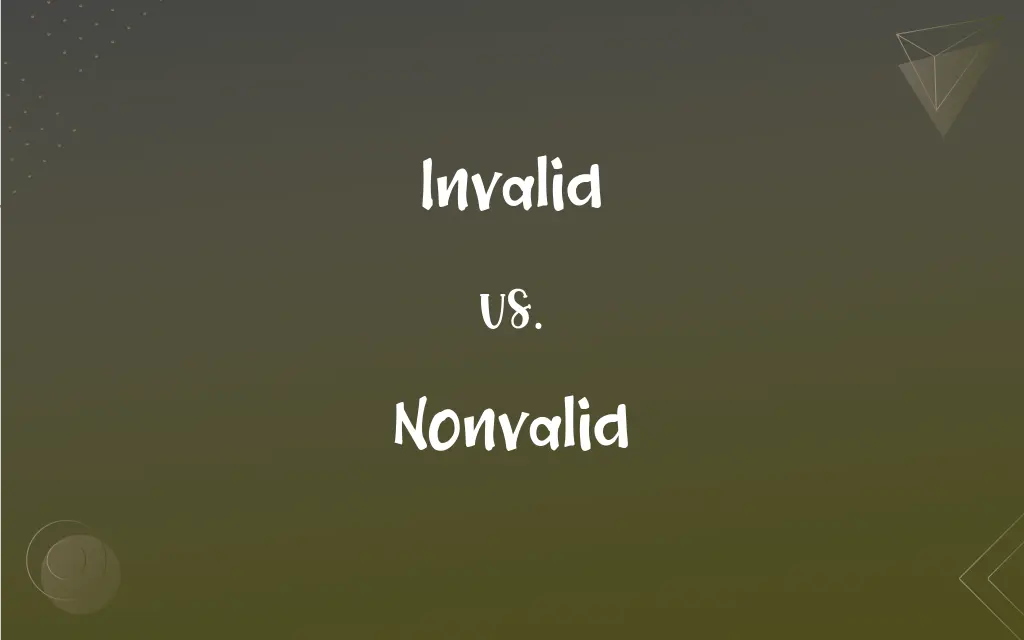Invalid vs. Nonvalid: What's the Difference?
Edited by Harlon Moss || By Janet White || Updated on October 4, 2023
Invalid typically means not correct, justifiable, or legally recognized; Nonvalid generally refers to the absence of validity, often in more formal or technical contexts.

Key Differences
“Invalid” is a term used broadly to signify that something is not correct, not justifiable, or not legally recognized. “Nonvalid,” while similar in implication, is usually used to refer to the absence or lack of validity, often used in more formal or logical contexts to denote that something does not have validity.
“Invalid” can be applied to a range of subjects, including arguments, tickets, or documents, implying they are not acceptable or are incorrect. “Nonvalid,” on the other hand, is more specialized and is typically used in the context of logical arguments or mathematical proofs, referring to the absence of soundness or correctness.
While “invalid” is a commonly used word in everyday language to describe anything that is not valid or correct, “nonvalid” is a term that is less common and is often reserved for specific, usually technical, contexts to denote the lack of validity or soundness.
In legal contexts, “invalid” is often used to describe contracts or laws that are not legally acceptable or recognized. “Nonvalid,” while it could theoretically be used in the same way, is more likely to be encountered in discussions of logic, computer science, or mathematics.
The term “invalid” encompasses a broad spectrum of incorrectness and unacceptability in various contexts, from casual to formal. “Nonvalid,” with its more technical and formal connotation, is generally specific to the realm of formal logic and mathematics, referring explicitly to the absence of validity.
ADVERTISEMENT
Comparison Chart
Usage
Broad
More specialized and formal
Contexts
Legal, casual, and formal contexts
Formal, logical, mathematical
Frequency
Commonly used
Less commonly used
Scope
Wide range of incorrectness
Specific absence of validity
Application
Documents, arguments, contracts
Logical arguments, proofs
ADVERTISEMENT
Invalid and Nonvalid Definitions
Invalid
Invalid can describe something that is not logically sound.
The conclusion drawn was invalid as it was based on a false premise.
Nonvalid
Nonvalid refers to the absence of validity or soundness, often in logic or mathematics.
The theorem was nonvalid, lacking logical coherence.
Invalid
Invalid signifies something that is not legally acceptable.
The contract was deemed invalid by the court.
Nonvalid
Nonvalid implies the absence of legal force or effect.
The nonvalid agreement had no legal standing.
Invalid
One who is incapacitated by a chronic illness or disability.
Nonvalid
Nonvalid can denote something that is not acceptable due to lack of formal approval.
The nonvalid certification could not be accepted as proof.
Invalid
Incapacitated by illness or injury.
Nonvalid
Nonvalid signifies something that is not established as true or genuine.
The claim was nonvalid, having no supporting evidence.
Invalid
Of, relating to, or intended for invalids.
Nonvalid
Nonvalid denotes the lack of conformity with a prescribed standard or set of conditions.
The nonvalid results were disregarded in the final analysis.
Invalid
Not legally or factually valid; null
An invalid license.
Nonvalid
Not valid.
Invalid
Falsely based or reasoned; faulty
An invalid argument.
Invalid
To incapacitate physically.
Invalid
Chiefly British To release or exempt from duty because of ill health
"I was not quite sick enough to be invalided out, even though I was of no more use" (Mary Lee Settle).
Invalid
Not valid; not true, correct, acceptable or appropriate.
Your argument is invalid because it uses circular reasoning.
This invalid contract cannot be legally enforced.
Invalid
Suffering from disability or illness.
Invalid
Intended for use by an invalid.
Invalid
Any person with a disability or illness.
Invalid
A person who is confined to home or bed because of illness, disability or injury; one who is too sick or weak to care for themselves.
Invalid
(archaic) A disabled member of the armed forces; one unfit for active duty due to injury.
Invalid
To exempt from (often military) duty because of injury or ill health.
He was invalided home after the car crash.
Invalid
(transitive) To make invalid or affect with disease.
Invalid
Of no force, weight, or cogency; not valid; weak.
Invalid
Having no force, effect, or efficacy; void; null; as, an invalid contract or agreement.
Invalid
Not well; feeble; infirm; sickly; as, he had an invalid daughter.
Invalid
A person who is weak and infirm; one who is disabled for active service; especially, one in chronic ill health who is unable to care for himself.
Invalid
To make or render invalid or infirm.
Invalid
To classify or enroll as an invalid.
Peace coming, he was invalided on half pay.
Invalid
Someone who is incapacitated by a chronic illness or injury
Invalid
Force to retire, remove from active duty, as of firemen
Invalid
Injure permanently;
He was disabled in a car accident
Invalid
Having no cogency or legal force;
Invalid reasoning
An invalid driver's license
Invalid
No longer valid;
The license is invalid
Invalid
Invalid refers to something that is incorrect or erroneous.
The ticket was invalid, so we couldn’t board the train.
Invalid
Invalid implies something that is not justifiable or substantiated.
The invalid argument led to a lot of confusion.
Invalid
Invalid denotes something not acceptable or recognized due to non-conformity with certain rules or conditions.
The code entered was invalid and access was denied.
FAQs
Is “invalid” commonly used in legal contexts?
Yes, “invalid” is often used to describe something not legally acceptable or recognized.
Can “invalid” be used in mathematical contexts?
Yes, it can describe a mathematical statement or proof that is not correct or sound.
Are “invalid” and “nonvalid” synonymous?
While similar, “invalid” is broadly used, while “nonvalid” is more formal and specialized.
Can “nonvalid” be used in casual conversation?
It’s less common and may sound overly formal or technical in casual conversation compared to “invalid.”
Can “nonvalid” describe a law or contract?
It could, but “invalid” is the more common term for laws or contracts.
Can “nonvalid” describe something incorrect or erroneous?
Yes, “nonvalid” implies a lack of validity, which can mean incorrectness or error.
Can “invalid” be used to describe logical arguments?
Yes, “invalid” can be used to describe arguments that are not logically sound.
Is “nonvalid” commonly used in computer science?
Yes, it can be used in computer science to describe, for example, nonvalid code or data.
Is “nonvalid” more formal than “invalid”?
Generally, “nonvalid” is considered more formal and specialized than “invalid.”
Is “nonvalid” specific to logical or mathematical contexts?
It is often used in these contexts, but it can be applied wherever validity is in question.
Is “invalid” used in everyday language?
Yes, “invalid” is a commonly used term in various contexts in everyday language.
Can “invalid” and “nonvalid” be used interchangeably in all contexts?
While they can be synonymous in some contexts, “invalid” is generally broader and more common, and “nonvalid” more formal and specialized.
Can “invalid” imply unacceptability?
Yes, it can describe something that is not acceptable due to incorrectness or non-conformity.
Can “nonvalid” be used to describe unacceptable documents?
While it could, “invalid” is the more typical term for such documents.
Is “invalid” considered formal?
It can be used both formally and informally, depending on the context.
About Author
Written by
Janet WhiteJanet White has been an esteemed writer and blogger for Difference Wiki. Holding a Master's degree in Science and Medical Journalism from the prestigious Boston University, she has consistently demonstrated her expertise and passion for her field. When she's not immersed in her work, Janet relishes her time exercising, delving into a good book, and cherishing moments with friends and family.
Edited by
Harlon MossHarlon is a seasoned quality moderator and accomplished content writer for Difference Wiki. An alumnus of the prestigious University of California, he earned his degree in Computer Science. Leveraging his academic background, Harlon brings a meticulous and informed perspective to his work, ensuring content accuracy and excellence.
































































